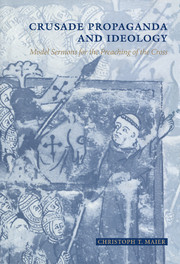Book contents
- Frontmatter
- Contents
- Acknowledgements
- List of abbreviations
- PART I
- 1 The authors, the sermons and their context
- 2 Crusade sermons and crusade model sermons
- 3 The texts and their structure
- 4 Portraying the crusade
- PART II
- 7 The sermons
- Appendix: The relationship between the crusade model sermons of Gilbert of Tournai and James of Vitry
- Bibliography
- Index of biblical citations
- General index
2 - Crusade sermons and crusade model sermons
Published online by Cambridge University Press: 19 January 2010
- Frontmatter
- Contents
- Acknowledgements
- List of abbreviations
- PART I
- 1 The authors, the sermons and their context
- 2 Crusade sermons and crusade model sermons
- 3 The texts and their structure
- 4 Portraying the crusade
- PART II
- 7 The sermons
- Appendix: The relationship between the crusade model sermons of Gilbert of Tournai and James of Vitry
- Bibliography
- Index of biblical citations
- General index
Summary
In the preface to the second edition of his sermons, Eudes of Châteauroux wrote the following:
I, Eudes, [cardinal] bishop of Tusculum, having before my mind's eyes this [passage] of Ecclesiastes: In the morning, sow your seed, and in the evening your hand shall not rest, refuse to disgrace the evening of my old age by idleness and wish to offer to the Lord an evening sacrifice, which consists of a fattened lamb; after the [earlier] sermons which I composed not by my own means but by a gift of God, from whom all wisdom, understanding and knowledge [come], I composed some more sermons and had them written down; those who are not so well trained in sacred writings may consult these, as may those who, because they are prevented by other business or pressed by time, cannot find free time to think about and arrange that which they have to preach to others.
Eudes worked on the revised edition of his sermons while staying with the papal court in Italy in the late 1260s. He was then probably already into his seventies and anxious to pass on his rich experience as a preacher to other clerics. From what Eudes tells us, his motive for recording his sermons was primarily didactic and not historiographic. His main aim was not to preserve a record for posterity of the sermons that he had preached throughout his life, but to write down his sermons in such a way that they might serve as models for other preachers.
When describing the process of writing his sermons, Eudes used the term componere.
- Type
- Chapter
- Information
- Crusade Propaganda and IdeologyModel Sermons for the Preaching of the Cross, pp. 17 - 31Publisher: Cambridge University PressPrint publication year: 2000



